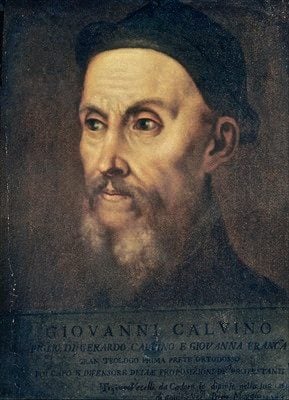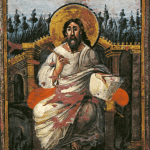We can’t know (any of us: Protestant or Catholic or green-eyed, one-legged, red-haired Rastafarian moth catcher) if we will be eschatologically saved because none of us know the future.
You may claim to know that by some interior revelation or something, but you really don’t. We all know people whom we thought were practicing Christians and hence “in the circle,” and they have since departed. Calvinists would have said of such people “they are saved.”
And since Calvinists believe in perseverance, those whom they declare as “saved” cannot fall away. But they do. So this highlights the human fallibility and lack of certain knowledge of the future that we all have (even, alas, Calvinists).
John Calvin denied, as I recall, that anyone can know with certainty that they are one of the elect (though he did – somewhat paradoxically – espouse personal, subjective “assurance” of salvation). All we can know with absolute certainty is that right now, we are not in mortal sin, and are desiring to love and serve God, despite all our failings.
And if we can examine our conscience and talk with God and determine that we are not gravely sinning, in which case we would jeopardize our eternal soul (as St. Paul repeatedly warns), then we have a high degree of “moral assurance” that we are in a good place spiritually with God and will be in every sense after we die, as long as we persevere in following Him, by His grace.
I don’t worry any more about my salvation as a Catholic, than I did as a Protestant. I have a rather robust faith and trust in God’s mercy, and I know that I am following Him wholeheartedly (except, of course, when I fall into sin, which is the bug in the ointment).
God gave us the mercy, certainty, guiding hand, and strength of the confessional to get back in good graces with God, brush ourselves off, and try to do our best once again.
But you don’t know you’re “saved” with an ironclad epistemological certainty anymore than I or anyone else knows.
*****
Here is what John Calvin taught with regard to knowledge of the elect:
. . . we are not bidden to distinguish between reprobate and elect – that is for God alone, not for us, to do . . . (Institutes of the Christian Religion, IV. 1. 3.)
We must thus consider both God’s secret election and his inner call. For he alone “knows who are his” [II Tim. 2:19] . . . except that they bear his insignia by which they may be distinguished from the reprobate. But because a small and contemptible number are hidden in a huge multitude and a few grains of wheat are covered by a pile of chaff, we must leave to God alone the knowledge of his church, whose foundation is his secret election. It is not sufficient, indeed, for us to comprehend in mind and thought the multitude of the elect, unless we consider the unity of the church as that into which we are convinced we have been truly engrafted. (Inst. IV. 1. 2.)
Of those who openly wear his badge, his eyes alone see the ones who are unfeignedly holy and will persevere to the very end [Matt. 24:13] – the ultimate point of salvation. (Inst. IV. 1. 8.)
It is . . . not our task to erase from the number of the elect those who have been expelled from the church, or to despair as if they were already lost. It is lawful to regard them as estranged from the church, and thus, from Christ – but only for such time as they remain separated. However, if they also display more stubbornness than gentleness, we should still commend them to the Lord’s judgment, hoping for better things of them in the future than we see in the present. Nor should we on this account cease to call upon God in their behalf . . . let us not condemn to death the very person who is in the hand and judgment of God alone; rather, let us only judge of the character of each man’s works by the law of the Lord. While we follow this rule, we rather take our stand upon the divine judgment than put forward our own. Let us not claim for ourselves more license in judgment, unless we wish to limit God’s power and confine his mercy by law. For God, whenever it pleases him, changes the worst men into the best, engrafts the alien, and adopts the stranger into the church. And the Lord does this to frustrate men’s opinion and restrain their rashness – which, unless it is checked, ventures to assume for itself a greater right of judgment than it deserves. (Inst. IV. 12. 9.)
The election of God is hidden and secret in itself . . . men are being fantastic or fanatical if they look for their salvation or for the salvation of others in the labyrinth of predestination instead of keeping to the way of the faith which is offered them . . . To each one, his faith is a sufficient witness of the eternal predestination of God, so that it would be a horrible sacrilege to seek higher assurance. (Commentary on John 6:40; in Francis Wendel, Calvin: Origins and Development of His Religious Thought, translated by Philip Mairet, New York: Harper & Row, 1963, 270)
Let us, then, keep this in view above all other things, that it is no less insane to crave for other knowledge of predestination besides that which is given us in the word of God, than if one wanted to walk over inaccessible rocks or to see in darkness. (Inst. III. 21. 2.; in Wendel, ibid., 270-271)
Calvin even went so far as to state that we should never conclude that even obstinate excommunicates are lost or determined to not be of the elect by their sinful behavior, and should hope better for them (Inst. IV. 12. 9.) After citing this passage (seen above), Wendel summarizes his entire lengthy treatment of Calvin’s viewpoint on this subject:
This is no more than an application of the principle that the judgments of God are incomprehensible and unfathomable to us, and that it is therefore impossible, in spite of all the ‘signs’ that may be given, for us at this present time to distinguish the elect from the reprobate . . . we have no right to inquire into its [i.e., reprobation’s] effects upon the plane of the Church or in our relations with other men. We have not to make ourselves the executors of the judgments that we may attribute with more or less probability to God. Predestination will be fully revealed to us only in the life beyond. (Ibid., 284)
*****
Meta Description: Many Calvinists seem to think they know who is saved and part of the elect, whereas John Calvin said only God knows.
Meta Keywords: Calvinism, Calvinist soteriology, election, eternal security, irresistible grace, Limited atonement, Once saved always saved, perseverance of the saints, predestination, Reformed soteriology, Salvation, elect, soteriology, sovereignty, Thomism, total depravity, TULIP, unconditional election, universal atonement














